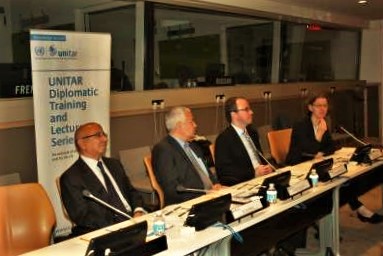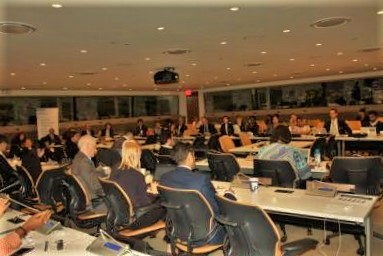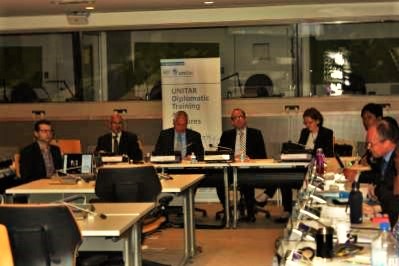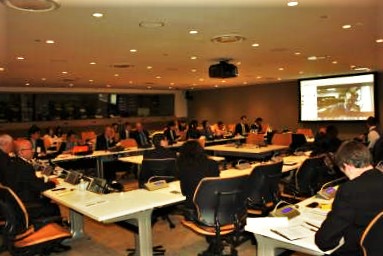UNITAR Delivers QCPR Module 3 Training for New York Based Diplomatic Community
24 May 2016, New York, USA - The United Nations Institute for Training and Research's (UNITAR) New York Office organized the event, “QCPR Module 3,” on 24 May 2016 at U.N. Headquarters in partnership with UNDESA and the Permanent Mission of Switzerland to the United Nations. The seminar was attended by approximately 40 delegates from Permanent Missions to the United  Nations. Mr. Marco A. Suazo, representing UNITAR’s New York Office, opened the seminar and briefed the event’s topic: funding trends, funding of operational activities and impacts of funding. The seminar was moderated by Mr. Navid Hanif, Director of the Office for ECOSOC Support and Coordination of UNDESA. Mr. Hanif illustrated the broad picture of recent U.N. funding activities. He discussed the challenges of fragmented funding structures in comparison to the three key components of funding, adequacy, predictability and flexibility.
Nations. Mr. Marco A. Suazo, representing UNITAR’s New York Office, opened the seminar and briefed the event’s topic: funding trends, funding of operational activities and impacts of funding. The seminar was moderated by Mr. Navid Hanif, Director of the Office for ECOSOC Support and Coordination of UNDESA. Mr. Hanif illustrated the broad picture of recent U.N. funding activities. He discussed the challenges of fragmented funding structures in comparison to the three key components of funding, adequacy, predictability and flexibility.
Mr. Andrew MacPherson, the Economic Affairs Officer at the Office of Economic and Social Council (ECOSOC) in UNDESA, presented on U.N. funding trends. Mr. MacPherson addressed imbalances in the allocation U.N. funding; noting that nearly all of the funding increases in recent years has gone to humanitarian assistance instead of development as donors increasingly contribute to non-core (ear-marked) funds. He also addressed the U.N.’s narrow funding pathways, namely that most contributions come from less than 10 countries and are concentrated in a few specific programmes, leaving little for other agencies to draw from. Mr. MacPherson presented core-fund  stagnancy and non-core fund growth as leading to a sense of fund scarcity, which in turn incentivizes competition between agencies and further fuels non-core funding increases as agencies strive to gain funds outside of increasingly scarce core resources. In addition to these issues are understandable demands by donor state populaces for greater transparency in their budgets. This results in states moving toward non-core contributions, as they are more easily defined and thus defended in domestic political arenas. During the Q&A session, participants raised several issues such as U.N. conceptualization of core versus non-core funding, cost recovery by core funding, diversified NGOs and private sector contributions, and the implication of transparency.
stagnancy and non-core fund growth as leading to a sense of fund scarcity, which in turn incentivizes competition between agencies and further fuels non-core funding increases as agencies strive to gain funds outside of increasingly scarce core resources. In addition to these issues are understandable demands by donor state populaces for greater transparency in their budgets. This results in states moving toward non-core contributions, as they are more easily defined and thus defended in domestic political arenas. During the Q&A session, participants raised several issues such as U.N. conceptualization of core versus non-core funding, cost recovery by core funding, diversified NGOs and private sector contributions, and the implication of transparency.
Ms. Henriette Keijzers, the  Deputy Executive Coordinator of the Multi-Partner Trust Fund (MPTF) Office within United Nations Development Programme (UNDP), overviewed alternative funding models for the 2030 Agenda. Ms. Keijzers described the trustees, governance, and implementation of pooled funding and demonstrated that U.N. pooled funds can achieve effectiveness and efficiency. In addition, she explained the advantages and disadvantages of inter-agency pooled funds, as well as recent trends and examples of U.N. inter-agency pooled funds. Ms. Keijzers proposed that U.N. pooled funds could be an investment vehicle for Agenda 2030. During the Q&A session, participants raised questions regarding the relationship between inter-agency funding and delivery as one, the differences between thematic funds and inter-agency pooled funds, competition for funding among U.N. agencies, the relationship between core funding and pooled funding, and funding trends for humanitarian assistance and development.
Deputy Executive Coordinator of the Multi-Partner Trust Fund (MPTF) Office within United Nations Development Programme (UNDP), overviewed alternative funding models for the 2030 Agenda. Ms. Keijzers described the trustees, governance, and implementation of pooled funding and demonstrated that U.N. pooled funds can achieve effectiveness and efficiency. In addition, she explained the advantages and disadvantages of inter-agency pooled funds, as well as recent trends and examples of U.N. inter-agency pooled funds. Ms. Keijzers proposed that U.N. pooled funds could be an investment vehicle for Agenda 2030. During the Q&A session, participants raised questions regarding the relationship between inter-agency funding and delivery as one, the differences between thematic funds and inter-agency pooled funds, competition for funding among U.N. agencies, the relationship between core funding and pooled funding, and funding trends for humanitarian assistance and development.
Ms. Piera Tortora, Economist at the Development Co-operation Directorate of the Organisation for Economic Co-operation and Development (OECD), spoke remotely from Paris regarding donor policies and the implications of the U.N. funding architecture from the viewpoint of a non-U.N. multilateral organization. Ms. Tortora began her presentation with key statistics on multilateral organizations’ funding trends and different funding patterns across different multilateral groups. It was particularly observed that U.N. funding is increasingly more earmarked than its counterparts and that the UN’s core funding is decreasing. Ms. Tortora also presented diversified contribution patterns between the OECD Development Assistance Committee (DAC) member states, an increasing trend of non-core funding, changes of funding modalities, and the increasing awareness of predictability by donors. Ms. Tortora touched upon key issues regarding new multilateral institutions, new contributors, and future trends relevant to the 2030 Agenda. During the Q&A session delegates discussed new trends due to new sources of funding and recent approaches taken by DAC states.
 Mr. Anders Pedersen, the U.N. Resident Coordinator in Botswana, presented by Skype and lent a field perspective on how to improve funding towards the 2030 Agenda. Mr. Pedersen calls for the U.N. to provide an innovative approach for its own value-added compatible with country perspectives like Botswana, a middle-income country, towards the long-term development agenda. Mr. Pedersen pointed out that funding quality is crucial due to rapid economic growth in Africa. Mr. Pedersen urged headquarters to focus on the changing nature of development in Africa while reiterating that the U.N. should act as one and in cooperation and support of country level governments as they take the reins of their own development. During the Q&A session pressing issues were raised, including policy changes at U.N. headquarters, obstacles to the One UN, and duplication of U.N. resources.
Mr. Anders Pedersen, the U.N. Resident Coordinator in Botswana, presented by Skype and lent a field perspective on how to improve funding towards the 2030 Agenda. Mr. Pedersen calls for the U.N. to provide an innovative approach for its own value-added compatible with country perspectives like Botswana, a middle-income country, towards the long-term development agenda. Mr. Pedersen pointed out that funding quality is crucial due to rapid economic growth in Africa. Mr. Pedersen urged headquarters to focus on the changing nature of development in Africa while reiterating that the U.N. should act as one and in cooperation and support of country level governments as they take the reins of their own development. During the Q&A session pressing issues were raised, including policy changes at U.N. headquarters, obstacles to the One UN, and duplication of U.N. resources.
At the end of the seminar, Mr. Hanif asked for feedback from all delegates regarding their perspectives on the issue of funding and then Mr. Suazo closed the seminar.
Photos: Participants, facilitators, and presenters of the seminar.

